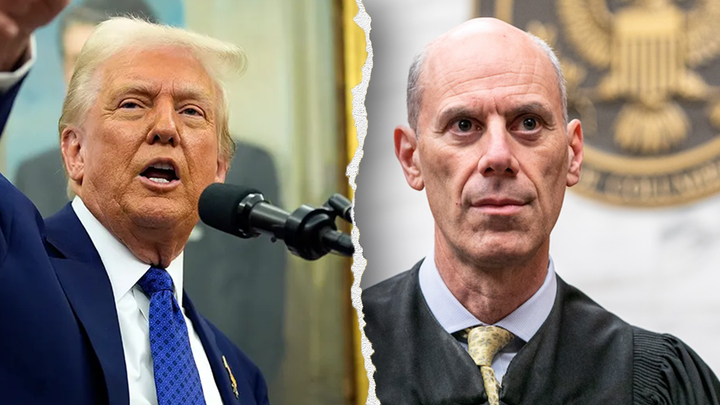A federal judge will hear from government lawyers Thursday to determine whether the Trump administration defied court orders when it deported hundreds of migrants to El Salvador last month.
The hearing marks the latest clash between President Donald Trump and U.S. District Judge James Boasberg, who Trump has publicly attacked as an “activist” judge and called for his impeachment. At issue is whether the administration knowingly violated Boasberg’s emergency order, which temporarily blocked the deportations and required that any individuals removed under a centuries-old immigration law be “immediately” returned to U.S. soil. Flights carrying migrants, including those deported under the 1798 Alien Enemies Act, still landed in El Salvador that same night.
“Oopsie…” El Salvador’s president, Nayib Bukele, wrote on X after they landed in his country. “Too late.”
Boasberg, who issued the emergency orders at the center of the controversial and complex case, has said he intends to find out whether the administration knowingly violated them, and who, if anyone, should be held accountable.
‘WOEFULLY INSUFFICIENT’: US JUDGE REAMS TRUMP ADMIN FOR DAYS-LATE DEPORTATION INFO
“The government isn’t being forthcoming,” Boasberg told Justice Department attorney Drew Ensign during an earlier hearing. “But I will get to the bottom of whether they complied with my order, who violated it and what the consequences will be.”
At Thursday’s hearing, Boasberg is expected to revisit many of the same questions he raised earlier, including how many planes left the U.S. carrying individuals deported “solely on the basis” of the Alien Enemies Act. Other questions include how many individuals were on each plane and what time and from which location each plane took off.
Although the administration has already appealed the case twice – first to the D.C. Circuit, which upheld Boasberg’s order, and then to the Supreme Court – the judge is still pressing for answers. Thursday’s hearing is part of his effort to determine whether the government defied the court when it carried out the deportation flights.
APPEALS COURT BLOCKS TRUMP ADMIN’S DEPORTATION FLIGHTS IN ALIEN ENEMIES ACT IMMIGRATION SUIT

The Alien Enemies Act, passed in 1798, has been used only three times in American history – during the War of 1812 and the two world wars – making its modern application by the Trump administration a rare legal maneuver.
Trump officials have argued invoking the law is necessary to expel dangerous individuals, including alleged members of the Tren de Aragua gang, who were flown to El Salvador under the administration’s new deportation policy.
Meanwhile, plaintiffs have pushed back on the administration’s use of the 1798 law, calling its use during peacetime “unprecedented.”
In a brief filed to the Supreme Court earlier this week, plaintiffs argued the law permits immediate deportations only in cases of a “declared war” or an “invasion or predatory incursion” by a foreign nation, conditions they say don’t apply to the Venezuelan nationals targeted for removal.
Government lawyers have declined to disclose key details about the deportation flights, including whether any planes departed after Boasberg’s order, citing national security protections.
Boasberg had previously warned the administration of consequences if it violated his order and criticized earlier filings as “woefully insufficient,” noting the government also refused his offer to submit information under seal.
APPEALS COURT BLOCKS TRUMP ADMIN’S DEPORTATION FLIGHTS IN ALIEN ENEMIES ACT IMMIGRATION SUIT
The case has become a political flash point over the balance of power between the courts and the executive branch. Trump allies dismiss much of the judiciary’s involvement as the work of “activist” judges seeking to rein in the president and overstep their constitutional role.
Trump’s demand for Boasberg to be impeached prompted a rare public rebuke from Supreme Court Chief Justice John Roberts.
“For more than two centuries, it has been established that impeachment is not an appropriate response to disagreement concerning a judicial decision,” Roberts said in a statement. “The normal appellate review process exists for that purpose.”
The White House has kept up its criticism of the lower courts, with press secretary Karoline Leavitt last month accusing judges of overstepping their bounds and infringing on the president’s authority.
“The administration will move quickly to pursue Supreme Court review, defend the Constitution, and protect the American people,” Leavitt said in a statement.
Read the full article here

